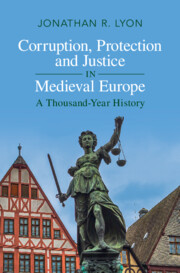Book contents
- Corruption, Protection and Justice in Medieval Europe
- Corruption, Protection and Justice in Medieval Europe
- Copyright page
- Dedication
- Contents
- Maps and Figures
- Acknowledgments
- Abbreviations
- Additional material
- Introduction
- 1 The First “Medieval” Advocates
- 2 Putting Down Roots in Ninth-Century Francia
- 3 The “Aristocratization” of Post-Carolingian Advocacy
- 4 Elite Competition at the Turn of the First Millennium
- 5 The Limits of Church Reform
- 6 Pigs and Sheep, Beer and Wine, Pennies and Pounds
- 7 A History of Violence
- 8 Weapons of the Not-So-Weak
- 9 The Murder of Archbishop Engelbert
- 10 Widening the Lens
- 11 The Emperor as Vogt, ca. 1000–1500
- 12 From Lordship to Government?
- 13 Reframing the History of Violence
- 14 Crossing the False Divide
- 15 A Cultural History of the Rapacious Advocate, or: William Tell’s Revenge
- Conclusion
- Works Cited
- Index
8 - Weapons of the Not-So-Weak
Published online by Cambridge University Press: 12 October 2022
- Corruption, Protection and Justice in Medieval Europe
- Corruption, Protection and Justice in Medieval Europe
- Copyright page
- Dedication
- Contents
- Maps and Figures
- Acknowledgments
- Abbreviations
- Additional material
- Introduction
- 1 The First “Medieval” Advocates
- 2 Putting Down Roots in Ninth-Century Francia
- 3 The “Aristocratization” of Post-Carolingian Advocacy
- 4 Elite Competition at the Turn of the First Millennium
- 5 The Limits of Church Reform
- 6 Pigs and Sheep, Beer and Wine, Pennies and Pounds
- 7 A History of Violence
- 8 Weapons of the Not-So-Weak
- 9 The Murder of Archbishop Engelbert
- 10 Widening the Lens
- 11 The Emperor as Vogt, ca. 1000–1500
- 12 From Lordship to Government?
- 13 Reframing the History of Violence
- 14 Crossing the False Divide
- 15 A Cultural History of the Rapacious Advocate, or: William Tell’s Revenge
- Conclusion
- Works Cited
- Index
Summary
This chapter argues that monasteries and churches employed a variety of different strategies to try to counter advocates’ corrupt practices. One of the most popular was forging documents (especially royal privileges) in an effort to alter the terms of their relationships with their advocates. Many ecclesiastics also traveled to the German imperial court or the Papal See in Rome to seek outside support and to request that the ruler or pope remove advocates from their local positions. Requests to the papacy were backed by a growing body of canon law dedicated to the issue of church advocacy. Nevertheless, these strategies were frequently unsuccessful. By the early thirteenth century, it therefore became increasingly common for monasteries and churches to offer their advocates monetary payments in return for those advocates relinquishing all of their rights.
- Type
- Chapter
- Information
- Corruption, Protection and Justice in Medieval EuropeA Thousand-Year History, pp. 174 - 196Publisher: Cambridge University PressPrint publication year: 2022



